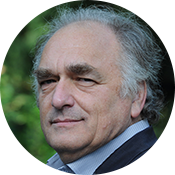Interview with Robert Rubinstein of TBLI Group
Businesses today are not always expected to put the welfare of people and the planet first. But it is possible for a business to be both profitable and responsible. Robert Rubinstein of TBLI Group has dedicated his life to educating financial professionals on why triple bottom line investing for people, planet, and profit, or the “three pillars of sustainability,” is good for business and for the world.
This interview has been edited and condensed for length.
Parvati Magazine: What are business sector “pain points” and how do you use them to encourage businesses to explore triple bottom line investing?
Robert Rubinstein: The pain points are basically finance, personnel, and reputation. If you can put pressure on one of those three, or all three, you’ll get businesses’ attention. Personnel is an effective pain button but it’s a slow process. Reputation is also very effective yet hard to influence. I chose finance because of the concentration of wealth in very few hands. We’ve focused on showing financial investors why this is relevant to them and using their leverage. If companies can’t get money because investors think it’s too risky environmentally, socially, and governance-wise, then they’ll start to change.
PMAG: What do you mean when you say this work is like the Shawshank Redemption approach?
RR: I forgot the number of years that character was in prison digging that hole. A long time.
We’ve been digging for the last 25 years. It’s changing the mindset of the institutional investor by showing them what they need to see. It’s a slow process but eventually you get there, in little wins. That’s why I call it the Shawshank Redemption approach because a lot is happening but no one notices until you’re gone.
I’m not used to being the flavor of the month but now investors are seeing that this is relevant to them, and when they do that, they start to move.
PMAG: 25 years is a long time. Looking back, what’s made the biggest difference in helping us create an economy that supports rather than inhibits well-being?
RR: It’s many, many things that have come together. When we started, there was no Carbon Tracker [Institution], there was no PRI [Principles for Responsible Investment], there was no Carbon Disclosure Project, no Montreal Pledge. Many of those institutions have come along over the last five to ten years.
We’ve had developments like the Freshfield’s Report I & II, legal research by the largest law firm in the world, saying that companies who don’t look at external financial issues are not fulfilling their fiduciary duty and that’s opening themselves up to liability.
Then you have the growth of the millennials and the wealth transfer that is happening in the next 20, 25 years. All of these collectively create a perfect storm. I’ve worked with many other things, similar things, that helped TBLI be an “overnight success” after 25 years.
PMAG: How is the growth of triple bottom line investing affecting the move toward an environmentally sustainable world economy? Will we reach the tipping point before it’s too late?
RR: I’m not that optimistic in the short term. I mean, there are solutions but it’s not like what Roosevelt did during World War II when there was a sense of urgency and he threw every single thing at it. He’d seen the level of production shift and he said, “We’re not going to make cars anymore. We’re just going to make planes and tanks.” That level of commitment. In general, no one’s taking big steps.
The solutions are there. There’s a lot of positive developments and the money flows are going in the right direction. But are they going fast enough?
PMAG: What gives you hope and keeps you going?
RR: I do see progress. We’re going in the wrong direction, but we’re slowing down. We’ll see when we make a complete U-turn and allocate the resources that we need. I ask people, “Do you want a financial return with a social, environmental added value?” I’ve never had anyone in 25 years say, “No. I want all my money to make life miserable for others and I’m working at that 24 hours a day.” No one thinks like that. It’s an issue of education. They just don’t realize that they can have a great return on their investment, and a financial, social, environmental and government added value, if they want to.
I’m optimistic because I have far fewer conversations now about why and far more conversations about how.












